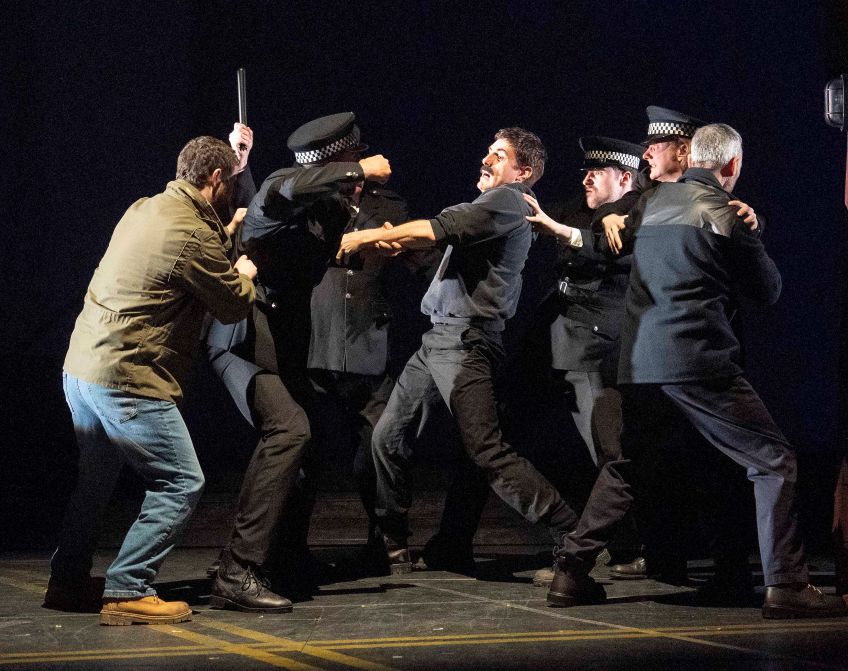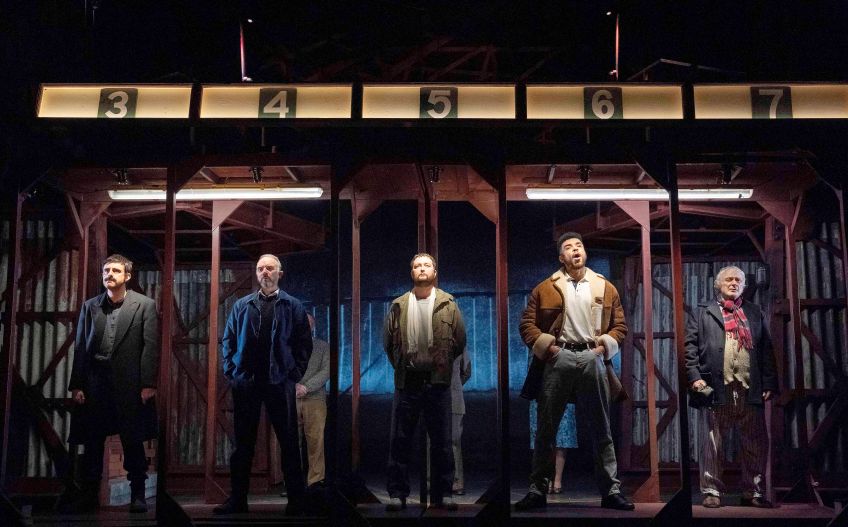Blackstuff first hit our TV screens in a big way in 1980 as a BBC Play for Today. Five Bafta-winning episodes of Boys from the Blackstuff then screened in 1982, a seminal TV drama phenomenon, full of pain, grit, tragedy, powerful characters, thoughts philosophical, religious and political, all laced through with dark humour and a touch of farce, in which Alan Bleasdale follows up the lives of those original characters. It was forty years, though, before someone grasped the nettle of adapting the episodes for the stage and distilling six or so hours into two. That was James Graham (writer of TV’s Sherwood).
Act One is especially fast-paced, busy, fragmented and snippety with rapid dialogue and interactions between many characters, while the Middlesborough goings-on in Bleasdale’s initial play are now inserted in brief flash-back. It’s wonderful stuff but confusing at times, perhaps, for those with no prior knowledge. Harmonised, folky bursts of ‘They laid it in the hollows..” , snatches of sea shanty and synchronised movement punctuate proceedings, too, while a couple of superb slow-motion sequences have huge impact: it’s a powerful scene as (otherwise absent) music swells and slow-motion, truncheon-wielding cops move in or when the hapless Snowy falls through the air to the ground below. The disparate stories and characters gradually draw together to great audience appreciation, especially through the second act with its fuller, more intimate focus on individuals, Chrissie, Loggo, Yosser, George and Dixie and their families.

These unemployed, impoverished men, skilled, experienced layers of tarmac – the blackstuff – hail from Liverpool, one of the places hardest hit when unemployment soared and despair took hold as, pre-Thatcher and under Thatcher, more than a century of reliable, manual labour for working-class men swiftly declined and disappeared. As the gap between upwardly-mobile yuppy “haves” and downwardly-plummeting underdog “have-nots” grew ever wider, the pride and self-respect that men had formerly derived from their roles as family breadwinner and skilled, hard-working worker were stripped away. Desperate for work, despised and chastised, Bleasdale’s men hunt and beg repeatedly for jobs, desperate to regain pride in providing for their families, and if they can’t practise the skills they’ve honed, they must turn their hand to anything, albeit dodgy. But they’re rejected at every hostile turn, the system working against them all the way, grinding them down, destroying their relationships with family and friends to both tragic and comic effect.
As Bleasdale and Graham sprinkle uplifting laughter into bitter tears and dark times, much humour springs from the fact that, while struggling to live on inadequate unemployment benefits, it’s illegal for the men – or their wives or family members – to take on any work whatsoever. Snooping, skulking (often bungling and incompetent) “sniffers” from The Department of Employment spy, lurk and tail suspects to collar them in flagrante when they secretly take cash-in-hand jobs. Dogged pursuits lead to both laughter and devastating tragedy. Sian Polhill-Thomas’s sturdy, sensible Ms Sutcliffe at the Department of Employment is fully aware of the madness of what’s going on in a society where unemployment is the biggest growth industry, for if all those taking jobs to deal with the unemployed masses didn’t take those jobs, they’d be queuing for benefits themselves. It’s all mad, she says, and we all have to deal with it in our own way. That applies at all times, of course, to the world at large, too.

Working wonderfully well together to conjure up time and place are a handsome, versatile set, very splendid video graphics and lighting, impressive stagecraft and a huge generosity of props, slickly deployed. Top to bottom, side to side and on two levels, the stage is filled with sheets of rusting, corrugated iron, girders and beams. Behind two mighty, rusting gates at the centre evocative video graphics, largely black and white, show the swirling Mersey, dangling derricks or hint at the massiveness of the Anglican cathedral and the stain-glass of Paddy’s Wigwam at the other end of (the ironic) Hope Street, where Yosser confesses to Father Dan, “I’m desperate, Dan.” Early on clips run of police versus rioters, and of Mrs Thatcher, saying – without irony on her part, that a man without a job loses all self-respect.
As mists swirl, as rain falls, as rusty grids move, host of props neatly appear and disappear – smoking braziers and barrels, ropes and tools of the trade, a badly-laid section of brick wall, wooden chests, employment office desks with clunky telephones and numbered booths like greyhound stalls, sofas, front-doors, cigars and umbrellas. In instants we go from building site, employment office or funeral to pub, cafe, church, docks or family front room. Hosts of characters, all sturdily played by multi-role cast members, people the stage, fleshing out a feel for the era with wives, job-seekers, policemen, clergy and long-suffering gasman, milkman, student and lollipop lady.
The world over, different individuals react very differently in times of adversity according to personality, psychology, individual circumstances and views, and it’s this that makes the Bleasdale’s individuals so fascinating. Every member of the cast makes their mark with sturdy, energetic performances. Ged McKenna’s portrayal of George is particularly strong and touching as the older man’s health goes rapidly downhill towards death. Keen to help and advise the younger ones, his is a kindly voice of experience, balance and reason as he reminisces over Liverpool’s heyday when the docks flourished and there was work for all.
The dilemmas of Yosser Hughes, whose accelerating mental melt-downs might class him informally as a complete nutter, and of easy-going, nice guy, Chrissie Todd, particularly captivated the nation on TV and also take pre-eminence onstage. Jay Johnson plays the gruff-voiced, big-moustached, surly Yosser. Filled with intense hatred for himself after losing his job and subsequently his wife and kids, he grows ever more angry, frustrated, violent and delusional, unable to tolerate all the persecution and rejection that lead to him (and the rest) being treated as something less than human. His requests to, “Gizza job!” fall on deaf ears and he knows they will. Johnson’s Yosser isn’t as frightening and violently demented as Bernard Hill’s TV version – for he’d go insane himself doing that night after night if he were, but he certainly makes his mark.
Visually, emotionally, historically, philosophically, the play is packed with all sorts. It’s engaging, exciting, moving, depressing, horrific, funny and altogether exhausting. And it certainly makes you think.
Eileen Caiger Gray




